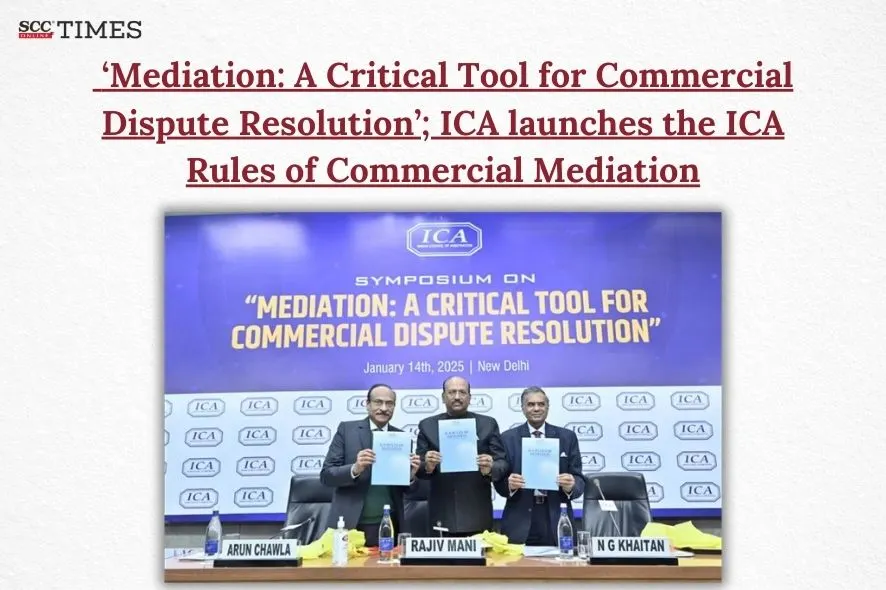The symposium brought together legal luminaries, scholars, policy stakeholders and seasoned ADR practitioners to delve into the transformative potential of commercial mediation in promoting efficient and economical dispute resolution, thereby leveraging India’s growth prospects. With policy stakeholders and ADR specialists speaking about the practicalities of commercial mediation in Indian landscape, the event was a climacteric moment for those interested in exploring the present and future potential of institutional mediation.
The opening address delivered by Mr Arun Chawla, Director General of ICA and Former Director General of FICCI (Federation of Indian Chambers of Commerce and Industry) wherein he stated that
“The introduction of the ICA Mediation Rules marks a significant milestone in our mission to make dispute resolution more accessible, faster, economical, and collaborative. Mediation is not just an alternative—it is a transformative tool for businesses seeking sustainable solutions with higher compliance rates. By encouraging dialogue and mutual understanding, mediation strengthens India’s economic ecosystem and builds confidence among stakeholders.”
Thereafter, in the welcome address by Dr. NG Khaitan, President, ICA and Senior Partner, Khaitan & Co., he said that
“Mediation, since time immemorial has been a way of dispute resolution at all levels of society in India. The legal fraternity as a unified structure needs to promote the use of mediation, as a cost and time efficient mode of dispute resolution. The Schedule II of Mediation Act, 2023 must increase its ambit of Central legislations, this will increase the usage and popularity of mediation amongst all categories of disputants”.
Dr. Rajiv Mani, Secretary of the Ministry of Law and Justice, Government of India, delivered the special address. He began his speech by stating how the ICA has taken a historic step in the field of mediation since there is currently an emphasis on mediation in the context of the new Mediation Act, 2023 (‘the Act’). He stated that all these methods were ways to access justice, as justice was not only dispensed in courts but also through alternative dispute-resolution mechanisms. He highlighted how the three mechanisms had their own benefits despite arbitration being the most successful.
He said that India had been a country of mediators, and mediation was in our blood, civilisation, and religion. But over a period of time, when the modern system of rights and duties crept in, the emphasis was laid on adversarial adjudication and the power of the courts to resolve disputes.
He highlighted how the Act also provides for the registration of mediated settlement agreements for those parties who need assurance and safety that the agreement will be honoured. Another novel feature of the Act is community mediation. Thus, mediation has a much wider scope as it is not only restricted to contractual and commercial disputes but also deals with family matters, matrimonial matters, etc. He underscored how mediation is being undertaken by many institutions in the country, such as Samadhan, a mediation centre under the aegis of the Delhi High Court.
He stated that the Act aims to encourage the parties to come out of their adversarial mindset and see the benefits of the mediation process which is not only a time-bound process but also allows the parties to have the key to resolution in the hands, unlike litigation. He added that if people who draft the contracts for such corporations and other such entities for commercial or contractual work include mediation in the contract, then mediation could take off.
Lastly, he highlighted the importance of mediation as an alternate mechanism to litigation for investors, which the ICA was popularising by holding such path-breaking events.
“It is not only that justice is dispensed in Courts, but also through these alternative dispute resolution mechanisms.”
-Dr. Rajiv Mani
After Dr Rajiv Mani’s speech, the ICA Rules of Commercial Mediation were launched.
The last key event of the symposium was a panel discussion on the topic ‘Efficacy of Mediation in Commercial Disputes’. The panel was chaired and moderated by Ms Pinky Anand, Senior Advocate and Former Additional Solicitor General of India, Supreme Court of India, and the panellists comprised of Mr Ajay Kumar Arora, Joint Secretary (Arbitration and Conciliation); Ms Priya Hingorani, Senior Advocate and Mediator, Supreme Court of India; Ms Shirin Khajuria, Senior Advocate and Mediator, Supreme Court of India; and Ms Varuna Bhandari Gugnani, Senior Advocate and Mediator, Supreme Court of India.
The discussion emphasized the significance of commercial mediation as a cost-effective, efficient, confidential and collaborative method to resolving disputes in today’s contemporaneous and globally interwoven commercial dispute landscape.
The symposium ended with a vote of thanks from Ms Geeta Luthra, Vice President ICA and Senior Advocate, Supreme Court of India.



